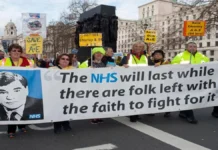
A track worker killed by a train in London was on a zero-hours contract, had work fatigue and was exposed to danger when his colleague did not arrive, investigators found yesterday.
“Victorian methods of protection”
Safety inspectors called for an overhaul of “Victorian methods of protection”, and demanded Network Rail review how its outsourced labour suppliers ensure people are fit to work. They said previous calls for reform, after a death in 2007 and a near-miss in 2017, had not been heeded.
The unnamed man, who was 37, was hit by a Southern train on November 6 2018 near Purley, south London, after placing equipment on the track to protect the line.
The Rail Accident Investigation Branch (RAIB) said that the worker was probably fatigued, and that a second person who should have been working alongside him did not turn up that night.
The RAIB report said that railway bosses have not “sufficiently identified and addressed the risk of fatigue among zero-hours contracted staff” and criticised the “Victorian methods of protection” that management offered its workers.
RAIB chief inspector Simon French said: “When workers are employed on a casual basis on zero-hours contracts, there can be great pressure for them to try and juggle multiple jobs to make ends meet.”
The report comes a week after the death of two other track workers in Port Talbot last week.
In response to this, Network Rail announced on Tuesday that it will launch a new safety task force with £70 million of funding to investigate and improve track worker safety.
Network Rail south east managing director Sam Chessex said the incident was a “terrible tragedy involving a member of the railway family,” adding: “As a result of this incident, we are reviewing our standards and our supplier practices to ensure they are focused on contractor safety.”
RMT union general secretary Mick Cash has called for an independent safety body, saying: “Warning after warning from this trade union over fatigue, zero hours and casualisation were not properly addressed by Network Rail or the safety regulator.
“As a result, lives are at a risk and that is a scandal.
“If those responsible for protecting the safety of rail workers are not doing their job then we need a genuinely independent safety inspectorate, with real teeth, not linked to budget controls and the cosy world of the industry players — which is the reality of the failed Office for Road and Railways model.”
This is a "Pay as You Feel" website Please help keep us Ad Free.
You can have access to all of our online work for free. However if you want to support what we do, you could make a small donation to help us keep writing. The choice is entirely yours.
























